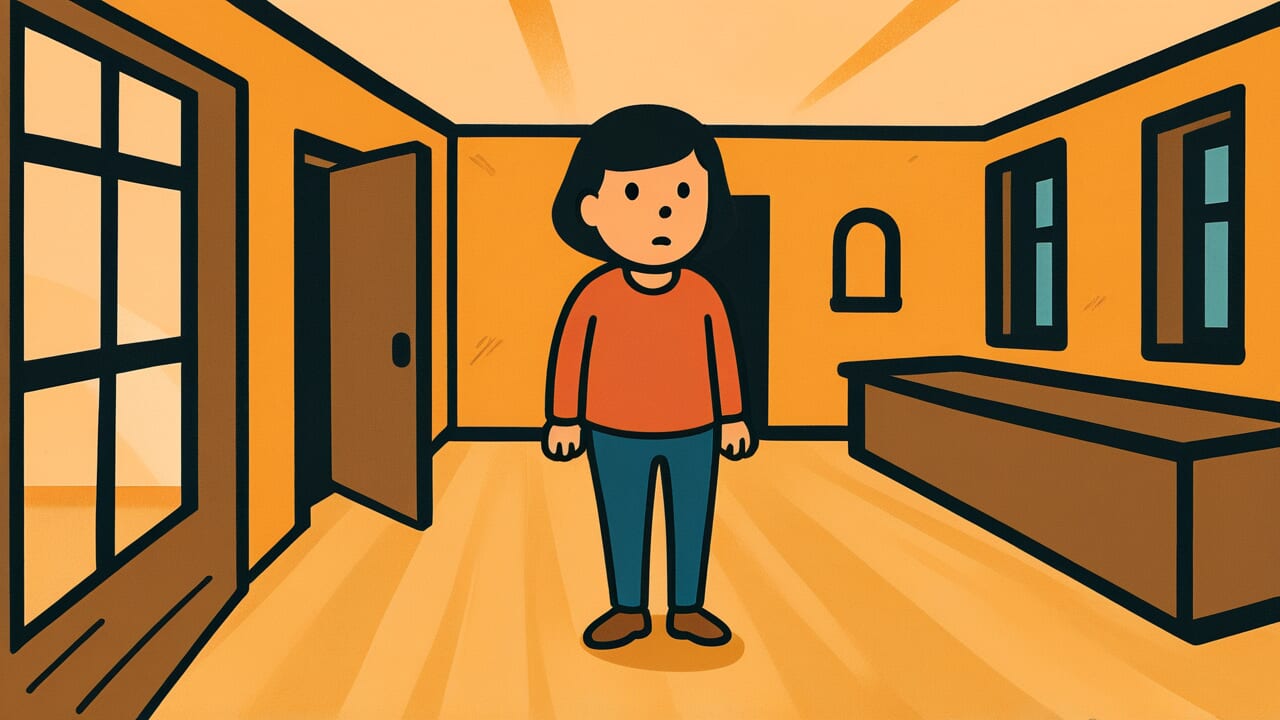How to Read “Shouting yourself hoarse in an empty house”
Akiya de koe karasu
Meaning of “Shouting yourself hoarse in an empty house”
“Shouting yourself hoarse in an empty house” is a proverb about wasted effort. It describes when you try really hard but get no results at all.
Imagine shouting loudly in an empty house. No matter how loud you yell, nobody answers. Your effort goes nowhere.
The problem isn’t that you’re trying hard. The problem is you’re trying in the wrong place, at the wrong time, or with the wrong person.
People use this saying when someone works hard but sees no results. This happens when the other person isn’t listening, doesn’t care, or simply isn’t there.
Today, this proverb reminds us to think about the “quality” of our efforts. It’s not enough to just work hard.
You need to check if the conditions are right for your effort to work. This helps you avoid wasting time and energy on things that won’t succeed.
Origin and Etymology
Nobody knows exactly when this proverb first appeared in writing. But we can guess its origins from Japanese life and culture.
“Empty house” means a house with no people inside. During the Edo and Meiji periods, families often traveled or left home for business.
Imagine someone visiting during that time. They call out loudly, but nobody answers. They shout until their voice becomes hoarse, but the empty house stays silent.
This frustrating experience became the basis for the proverb. It captures that feeling of wasted effort perfectly.
The phrase “voice becomes hoarse” shows desperation. It means shouting so hard and so long that your voice breaks.
Even with all that effort, if nobody’s home, it means nothing. This sharp contrast makes the proverb memorable.
In Japanese culture, houses and people are deeply connected. A house only has meaning when people live in it.
This proverb teaches that effort in the wrong direction brings no reward. It’s wisdom drawn from everyday life experiences.
Usage Examples
- I keep proposing new product ideas, but my boss shows zero interest. It’s like shouting yourself hoarse in an empty house.
- She’s completely closed her heart. Trying to convince her now is just shouting yourself hoarse in an empty house.
Universal Wisdom
“Shouting yourself hoarse in an empty house” reveals a basic truth about effort and results. We want to believe hard work always pays off.
But reality isn’t that simple. You can work seriously and give your best effort. But if you’re aiming in the wrong direction, everything goes to waste.
Our ancestors understood this harsh reality. That’s why they created this proverb.
People often feel satisfied just by trying hard. Shouting until your voice breaks makes you feel like you did your best.
But what really matters is whether your voice reaches someone. Shouting at an empty house only gives you false satisfaction.
This proverb has lasted because it warns against a common mistake. Many people think “if I just try hard enough, things will work out.”
The proverb values effort but reminds us to check the conditions first. Will your effort actually lead to results?
This wisdom never gets old. It’s not about how much you try. It’s about trying in the right way, at the right time, in the right place.
When AI Hears This
When you speak in an empty room, you naturally raise your voice. This happens because of something called a “zero-echo environment.”
Normally, your voice bounces off walls and furniture. Your ears hear this echo, and your brain adjusts your volume automatically.
But in an empty house, your voice gets absorbed. Nothing bounces back. Your brain thinks “my voice isn’t reaching anyone,” so it tells you to speak louder.
Scientists have tested this in special rooms called anechoic chambers. Most people feel anxious within 10 minutes. Their voices get much louder without them realizing it.
There’s also a psychological reason. When we talk to people, we watch their faces and listen for responses like “uh-huh” or nods.
Without these signals, your brain can’t confirm if your message is getting through. This creates anxiety, making you repeat yourself over and over.
So shouting yourself hoarse happens for two reasons: the physical space is empty (no sound bounces back) and the social space is empty (no human feedback).
Your brain and body naturally react to this double emptiness. That’s why effort in an empty place feels so exhausting and pointless.
Lessons for Today
This proverb teaches us to pause and think before we act. In our society, working hard is seen as good.
Asking “is this effort really worth it?” might make you look lazy. But avoiding wasted effort is actually smart.
It means saving your limited time and energy for things that truly matter. That’s not laziness—it’s wisdom.
In work and relationships, check first: Is the other person ready to listen? Is the timing right? Are the conditions good?
If you realize you’re in an “empty house,” don’t waste your voice there. Find a place where people can actually hear you.
This isn’t giving up. It’s choosing a path that actually works. Sometimes changing direction shows real strength.
Your effort is valuable. Don’t waste it where it can’t grow. Use it where it can make a real difference.
Don’t shout yourself hoarse in an empty house. Instead, find people who will listen. Speak to them with your whole heart.
When you do that, your effort will reach someone. It will touch their heart and bring wonderful results.



Comments